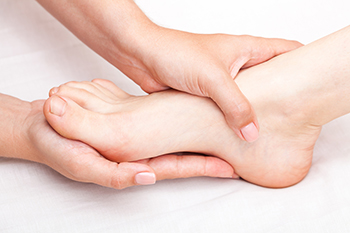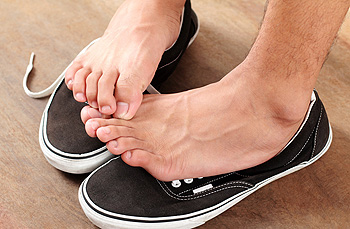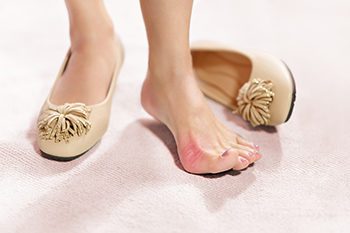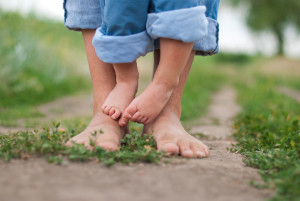Copyright © Michigan Foot and Ankle | Site Map | Nondiscrimination Policy | Design by: Podiatry Content Connection
July 2023
Education Requirements for Becoming a Podiatrist

There are branches of medicine that target specific areas of the body. Podiatry is aimed at treating disorders of the feet and ankles that can include common ailments, injuries, and deformities. The mandatory education to become a podiatrist begins with earning a bachelor's degree, followed by completing four years at a podiatric school. A residency program that will take three years to complete starts after podiatry school. This generally takes place in a hospital setting, which can provide the students with practical experience. At this point, qualified candidates will become a Doctor of Podiatric Medicine, which is abbreviated as DPM, and these letters will follow their name. Podiatry has become a popular branch of medicine as a result of increased incidents of diabetes and chronic diseases. These types of illnesses can affect the feet, and medical attention is often sought for relief. There are various forms of podiatry that can include sports medicine, wound care, and pediatrics. If you are interested in pursuing podiatry as a career, it is suggested that you converse with this type of doctor who can answer any questions you may have.
If you are experiencing pain in the feet or ankles, don’t join the stubborn majority refusing treatment. Feel free to contact one of our podiatrists from Michigan Foot and Ankle. Our doctors can provide the care you need to keep you pain-free and on your feet.
What Is a Podiatrist?
Someone would seek the care of a podiatrist if they have suffered a foot injury or have common foot ailments such as heal spurs, bunions, arch problems, deformities, ingrown toenails, corns, foot and ankle problems, etc.
Podiatric Treatment
A podiatrist will treat the problematic areas of the feet, ankle or lower leg by prescribing the following:
- Physical therapy
- Drugs
- Orthotic inserts or soles
- Surgery on lower extremity fractures
A common podiatric procedure a podiatrist will use is a scanner or force plate which will allow the podiatrist to know the designs of orthotics. Patients are then told to follow a series of tasks to complete the treatment. The computer will scan the foot a see which areas show weight distribution and pressure points. The podiatrist will read the analysis and then determine which treatment plans are available.
If you have any questions please feel free to contact one of our offices located in Ferndale, and Milford, MI . We offer the newest diagnostic and treatment technologies for all your foot and ankle needs.
Why Your Feet May Smell Bad

When a distinct foul odor emanates from your shoes or feet, it can be an indication of an infection. Bacteria thrive in warm, moist atmospheres, such as the inside of a shoe or between the toes. Two types of bacteria are common causes of foot odor as they interact with the sweat on the feet and produce chemicals that smell bad. Isovaleric acid emanates a cheesy, sweaty foot odor, while propionic acid projects a sour smell. In addition, brevibacteria, which eats the dead skin on the toes, can produce a gas that also smells sour. Socks and shoes that don’t allow sweat to evaporate from the skin can be another cause of foot odor. A fungal infection, or tinea, frequently termed athlete’s foot, can also result in foot odor. The first line of defense against smelly feet is developing a daily foot care and hygiene regime. Wash and dry the feet thoroughly, especially between the toes. Allow your shoes and socks to dry completely between wearings. If foot odor is an ongoing problem for you, it is suggested that you make an appointment with a podiatrist for an evaluation and possible treatment options.
Everyday foot care is very important to prevent infection and other foot ailments. If you need your feet checked, contact one of our podiatrists from Michigan Foot and Ankle. Our doctors can provide the care you need to keep you pain-free and on your feet.
Everyday Foot Care
Often, people take care of their bodies, face and hair more so than they do for their feet. But the feet are a very important aspect of our bodies, and one that we should pay more attention to. Without our feet, we would not be able to perform most daily tasks.
It is best to check your feet regularly to make sure there are no new bruises or cuts that you may not have noticed before. For dry feet, moisturizer can easily be a remedy and can be applied as often as necessary to the affected areas. Wearing shoes that fit well can also help you maintain good foot health, as well as making it easier to walk and do daily activities without the stress or pain of ill-fitting shoes, high heels, or even flip flops. Wearing clean socks with closed shoes is important to ensure that sweat and bacteria do not accumulate within the shoe. Clean socks help to prevent Athlete’s foot, fungi problems, bad odors, and can absorb sweat.
If you have any questions please feel free to contact one of our offices located in Ferndale, and Milford, MI . We offer the newest diagnostic and treatment technologies for all your foot and ankle needs.
Are You Suffering From Ingrown Toenails?
The Definition of a Bunion

A bunion is a progressive bone disorder and is considered to be a deformity. It is defined as a bony lump that develops on the side of the big toe and may change the structure of the foot. Severe bunions may cause the other toes to shift toward each other, and larger shoes may need to be purchased. A common reason why people get bunions can be from the shoes that are worn. If the shoe does not have adequate room for toes to move freely in, they may gradually become cramped, and a small bump may be noticeable. Bunions may also happen from genetic reasons, or possibly from having flat feet or low arches. Temporary relief may be found when a protective pad is placed over the bunion, in addition to wearing shoes that fit correctly. If you have developed a bunion, it is suggested that you visit a podiatrist who can provide a more permanent solution, which may include surgery for removal.
If you are suffering from bunion pain, contact one of our podiatrists of Michigan Foot and Ankle. Our doctors can provide the care you need to keep you pain-free and on your feet.
What Is a Bunion?
Bunions are painful bony bumps that usually develop on the inside of the foot at the joint of the big toe. As the deformity increases over time, it may become painful to walk and wear shoes. Women are more likely to exacerbate existing bunions since they often wear tight, narrow shoes that shift their toes together. Bunion pain can be relieved by wearing wider shoes with enough room for the toes.
Causes
- Genetics – some people inherit feet that are more prone to bunion development
- Inflammatory Conditions - rheumatoid arthritis and polio may cause bunion development
Symptoms
- Redness and inflammation
- Pain and tenderness
- Callus or corns on the bump
- Restricted motion in the big toe
In order to diagnose your bunion, your podiatrist may ask about your medical history, symptoms, and general health. Your doctor might also order an x-ray to take a closer look at your feet. Nonsurgical treatment options include orthotics, padding, icing, changes in footwear, and medication. If nonsurgical treatments don’t alleviate your bunion pain, surgery may be necessary.
If you have any questions, please feel free to contact one of our offices located in Ferndale, and Milford, MI . We offer the newest diagnostic and treatment technologies for all your foot care needs.
Proper Foot Care for Toddlers

The importance of teaching children during their early years about a good foot care routine may be crucial in preventing painful foot conditions as they get older. This can begin with washing and drying the feet daily, and it can help to apply a small amount of powder to their feet. Toddler’s feet may sweat more when they are younger, and this may help to keep them drier. It is beneficial that their feet and toes are kept warm, which may be helpful in maintaining body temperature. A baby’s foot can become stronger when they walk barefoot while indoors. This can be a result of the toes gripping the floor, which can benefit the entire foot. When the first shoes are purchased, it is helpful they are made of flexible materials in addition to having a sturdy sole. This can protect the feet while walking on various surfaces while outside. Some parents may notice an odor that comes from their child’s feet, and medical attention may be sought. It might be indicative that a fungal infection has developed, which can be a common occurrence from the 250,000 sweat glands that are found in the feet. If you would like to have more information about the health of your child’s feet, it is suggested that you confer with a podiatrist who will provide you with useful knowledge.
Making sure that your children maintain good foot health is very important as they grow. If you have any questions, contact one of our podiatrists of Michigan Foot and Ankle. Our doctors can provide the care you need to keep you pain-free and on your feet.
Keeping Children's Feet Healthy
Having healthy feet during childhood can help prevent medical problems later in life, namely in the back and legs. As children grow, their feet require different types of care. Here are some things to consider...
Although babies do not walk yet, it is still very important to take care of their feet.
Avoid putting tight shoes or socks on his or her feet.
Allow the baby to stretch and kick his or her feet to feel comfortable.
As a toddler, kids are now on the move and begin to develop differently. At this age, toddlers are getting a feel for walking, so don’t be alarmed if your toddler is unsteady or ‘walks funny’.
As your child gets older, it is important to teach them how to take care of their feet.
Show them proper hygiene to prevent infections such as fungus.
Be watchful for any pain or injury.
Have all injuries checked by a doctor as soon as possible.
Comfortable, protective shoes should always be worn, especially at play.
If you have any questions please feel free to contact one of our offices located in Ferndale, and Milford, MI . We offer the newest diagnostic and treatment technologies for all your foot and ankle needs.
Blog Archives
- April 2025
- March 2025
- February 2025
- January 2025
- December 2024
- November 2024
- October 2024
- September 2024
- August 2024
- July 2024
- June 2024
- May 2024
- April 2024
- March 2024
- February 2024
- January 2024
- December 2023
- November 2023
- October 2023
- September 2023
- August 2023
- July 2023
- June 2023
- May 2023
- April 2023
- March 2023
- February 2023
- January 2023
- December 2022
- November 2022
- October 2022
- September 2022
- August 2022
- July 2022
- June 2022
- May 2022
- April 2022
- March 2022
- February 2022
- January 2022
- December 2021
- November 2021
- October 2021
- September 2021
- August 2021
- July 2021
- June 2021
- May 2021
- April 2021
- March 2021
- February 2021
- January 2021
- December 2020
- November 2020
- October 2020
- September 2020
- August 2020
- July 2020
- June 2020
- May 2020
- April 2020
- March 2020
- February 2020
- January 2020
- December 2019
- November 2019
- October 2019
- September 2019
- August 2019
- July 2019
- June 2019
- May 2019
- April 2019
- March 2019
- February 2019
- January 2019
- December 2018
- November 2018
- October 2018
- September 2018
- August 2018
- July 2018
- June 2018
- May 2018
- April 2018
- March 2018
- February 2018
- January 2018
- December 2017
- November 2017
- October 2017
- September 2017
- August 2017
- July 2017
- June 2017
- May 2017
- April 2017
- March 2017
- February 2017
- January 2017






